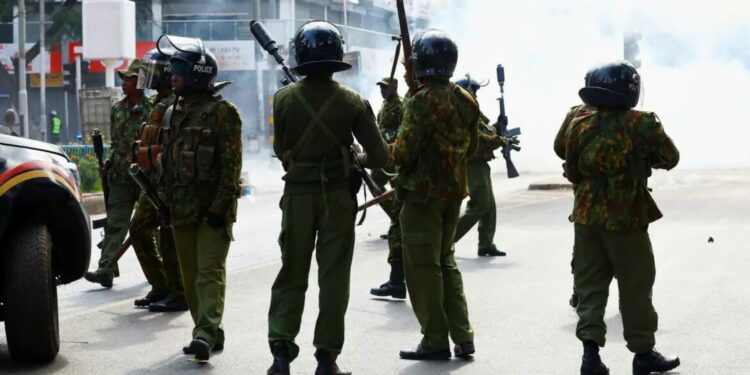At least 11 people have lost their lives in a wave of protests across Kenya, triggered by rising discontent over economic hardships and political grievances. The demonstrations, marking the annual “Saba Saba” (or “Seven Seven”) Day, have seen thousands mobilizing in cities nationwide, demanding government accountability and reform. In response, authorities have sealed off central Nairobi, deploying security forces in an effort to quell the unrest and prevent further violence. The protests, ignited by frustrations over inflation, unemployment, and perceived political inaction, reflect a deepening crisis in a country grappling with significant socio-economic challenges. As the situation unfolds, both the government and protesters face a critical juncture that could shape the nation’s future.
Saba Saba Protests Escalate in Nairobi as Casualties Rise and Tensions Flare
The situation in Nairobi has taken a grave turn as protests intensify, leading to a reported 11 deaths amidst escalating violence. Thousands have taken to the streets, fueled by discontent over government policies and demands for greater accountability. The authorities have responded with a heavy security presence, sealing off key areas of central Nairobi in a bid to maintain order. Residents are witnessing clashes between demonstrators and police, resulting in severe injuries and a growing list of casualties as the conflict unfolds.
The protests have highlighted several core issues that resonate deeply with the populace, including:
- High living costs affecting daily life
- Corruption within government ranks
- Demand for electoral reforms
In response, civil organizations are calling for a national dialogue, urging leaders to address these pressing concerns before the situation deteriorates further. While some protesters advocate for change through peaceful means, the increasing repression and violence are causing divisions within the movement, complicating the path forward for activists and supporters alike.
Government Response Amid Growing Unrest: Calls for Dialogue and Accountability
In response to escalating tensions and widespread demonstrations, the Kenyan government has intensified calls for open dialogue between opposing factions, urging citizens to prioritize peace over division. Amid the chaos, officials have emphasized the necessity of accountability in the wake of violence that has resulted in the tragic loss of lives. As the nation grapples with growing unrest, leaders are under pressure to address the underlying issues fueling public discontent, including economic hardships and calls for systemic reforms. Authorities are urging demonstrators to express their grievances through peaceful means, while simultaneously vowing to maintain order in major urban areas.
To facilitate constructive conversations, the government has proposed the establishment of a dialogue platform aimed at bridging the gap between various groups. Key stakeholders include political leaders, human rights organizations, and community representatives, all of whom are encouraged to participate in discussions that could pave the way for long-term solutions. The government has outlined specific measures to ensure accountability for actions taken by law enforcement during the protests, recognizing that transparency is vital for restoring trust. Critical points of discussion in upcoming forums will likely include:
- Economic reforms: Strategies to alleviate poverty and unemployment.
- Police conduct: Reviews of engagement protocols during protests.
- Political representation: Ensuring all voices are heard in governance.
Community Impact and Future Implications: Seeking Solutions to End Political Violence
The recent unrest in Kenya has sharply highlighted the ongoing struggle against political violence, which has deep roots in the nation’s history and governance. As protests erupted in response to rising discontent over economic hardship and perceived governmental neglect, 11 lives were tragically lost, demonstrating the volatile nature of the protests. Central Nairobi, once a hub of activity, was effectively sealed off as authorities attempted to maintain order amidst the chaos. This situation raises urgent questions regarding the methods of protest in a democratic society and the government’s obligation to address citizen grievances without resorting to force. These protests serve as a catalyst for broader discussions on accountability, civic engagement, and the pathways to lasting peace and stability in Kenya.
In the face of escalating tensions, community leaders and policymakers must prioritize constructive dialogue and collaboration to seek viable solutions. Initiatives might include community-driven forums to air grievances, engage in discourse, and brainstorm collective solutions. Some potential strategies could involve:
- Restorative justice programs aimed at healing divisions.
- Economic development projects to alleviate poverty and inequality.
- Investment in education to empower youth and reduce susceptibility to political manipulation.
Addressing the root causes of political violence is crucial for the future of Kenya. Engaging with citizens openly, while enforcing accountability among leaders, can foster a sense of national unity and resilience. The evolution of these protests may serve as both a warning and an opportunity for transformative change, setting the stage for a more peaceful and democratic future.
In Retrospect
As the Saba Saba protests continue to unfold across Kenya, the tragic loss of at least 11 lives underscores the escalating tensions in the nation. Central Nairobi remains heavily secured, with authorities ramping up measures to maintain order amid calls for political reform and accountability. The unrest not only highlights the deep-seated frustrations within the Kenyan populace but also raises critical questions about the government’s response to dissent and the rights of citizens to peacefully express their grievances. As the situation evolves, both local and international observers will be keenly monitoring developments, hoping for a resolution that prioritizes dialogue and the preservation of human rights. The road ahead for Kenya appears fraught with challenges, but it is clear that the voices demanding change will not be easily silenced.














